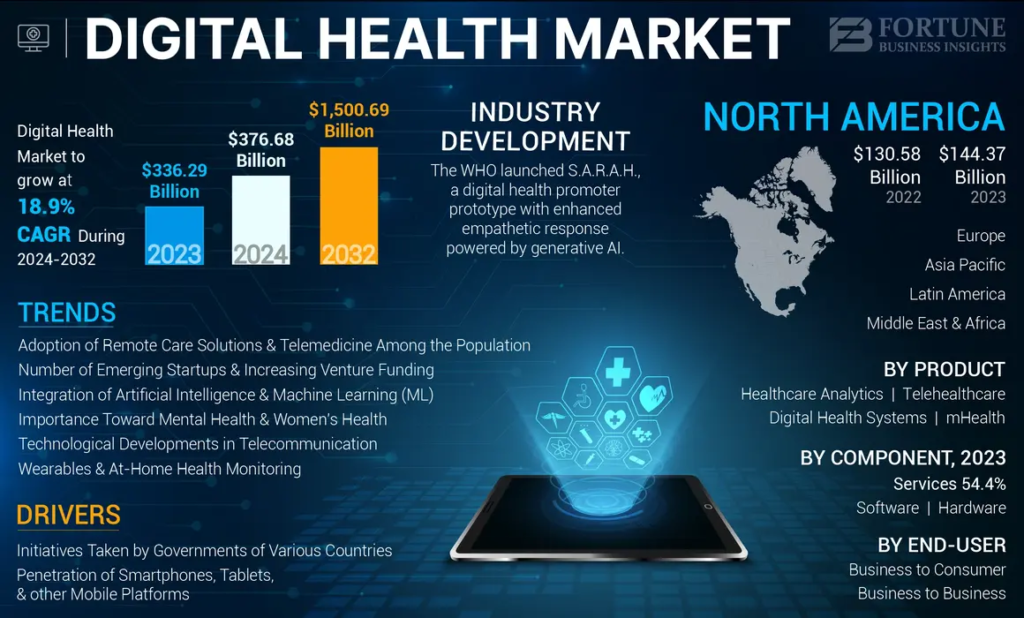Bahrain has been making significant strides in redefining healthcare delivery through innovative digital health initiatives. The country has embraced technology not only to improve patient care but also to ensure a more efficient, connected, and proactive healthcare system. From smart hospitals to telemedicine platforms, Bahrain is becoming a beacon of modern healthcare solutions in the Middle East.
The vision is clear: to provide seamless healthcare access, reduce waiting times, enhance patient engagement, and empower citizens to take control of their own health. With digital tools, patients can now experience healthcare in ways that were unimaginable a few years ago. This transformation is reshaping the healthcare landscape and creating a more inclusive and resilient system.
Telemedicine: Bringing Care Closer to Home
One of the most remarkable aspects of Bahrain’s healthcare evolution is the expansion of telemedicine. Telemedicine allows patients to consult with doctors and specialists without the need to visit a hospital physically. This approach not only saves time and travel costs but also ensures that even those in remote areas have access to quality healthcare.
Telemedicine services in Bahrain cover a wide range of specialties, from general consultations to chronic disease management. Patients can schedule video consultations, receive prescriptions digitally, and monitor their health through connected devices. The adoption of telemedicine has accelerated dramatically, particularly in response to global challenges like the COVID-19 pandemic, which highlighted the need for flexible and remote healthcare solutions.
Smart Health Platforms: Streamlining Patient Experiences
Bahrain has developed comprehensive digital health platforms that integrate various aspects of patient care into a single, user-friendly interface. These platforms allow patients to book appointments, access medical records, track test results, and communicate with healthcare providers seamlessly.
By centralizing health information, Bahrain’s digital platforms reduce administrative burdens, prevent errors, and provide healthcare professionals with a complete view of a patient’s history. This approach enhances treatment accuracy and allows for more personalized care. Patients feel empowered as they can actively participate in their health journey, monitoring progress and receiving timely reminders for check-ups and vaccinations.

AI and Data Analytics: Enhancing Decision-Making
Artificial intelligence (AI) and data analytics are playing a pivotal role in Bahrain’s digital health landscape. Advanced algorithms can predict disease outbreaks, identify high-risk patients, and recommend preventive interventions. AI-powered tools assist doctors in diagnosing complex conditions, interpreting imaging results, and even suggesting treatment plans based on global medical data.
Data-driven healthcare enables the system to become more proactive rather than reactive. Instead of waiting for patients to fall ill, healthcare providers can anticipate health challenges and act early. This predictive approach not only saves lives but also reduces the overall cost of healthcare by preventing complications and hospitalizations.
Mobile Health Apps: Empowering Individuals
Mobile health applications are another cornerstone of Bahrain’s digital health strategy. Citizens can access personalized health advice, track vital signs, and manage medications through user-friendly apps. These apps often integrate wearable devices that monitor heart rate, sleep patterns, and physical activity, providing real-time feedback to users and their healthcare providers.
By putting healthcare tools directly into the hands of individuals, Bahrain is fostering a culture of proactive health management. People can make informed lifestyle choices, adhere to treatment plans, and maintain continuous communication with their doctors. This empowerment transforms the patient experience, making healthcare more engaging, responsive, and preventative.
Digital Health in Rural and Remote Areas
Bahrain’s telemedicine expansion is particularly impactful for rural and remote populations. Previously, individuals living far from major hospitals faced significant barriers to healthcare, including long travel times and limited access to specialists. Today, telemedicine bridges that gap, ensuring that quality healthcare is available wherever it is needed.
Remote consultations, digital monitoring, and virtual follow-ups are reducing disparities in healthcare access. Patients no longer have to delay treatments or suffer from preventable complications due to logistical challenges. The convenience and reliability of these digital solutions are enhancing health outcomes and promoting equity across communities.
Enhancing Mental Health Support Through Technology
Digital health initiatives in Bahrain are also addressing mental health, a critical yet often overlooked aspect of overall well-being. Teletherapy sessions, mental health apps, and virtual support groups provide accessible and confidential support for those in need.
These tools help reduce the stigma around mental health by normalizing conversations and providing resources that are easy to reach. Individuals can receive therapy, track their emotional well-being, and connect with counselors without leaving their homes. This integration of mental health services into the broader digital healthcare framework underscores Bahrain’s commitment to holistic wellness.
Training and Capacity Building for Healthcare Professionals
The success of Bahrain’s digital health initiatives relies heavily on skilled healthcare professionals who can navigate advanced technologies. Training programs and continuous education initiatives ensure that doctors, nurses, and technicians are equipped to deliver high-quality digital care.
Workshops, online courses, and hands-on simulations familiarize healthcare staff with telemedicine tools, AI applications, and electronic health record systems. This investment in professional development not only improves patient outcomes but also fosters a culture of innovation within the healthcare sector. Professionals are empowered to leverage technology creatively, enhancing both efficiency and care quality.
Public-Private Collaboration: Driving Innovation
Bahrain’s digital health achievements are strengthened by collaboration between public institutions and private enterprises. Partnerships with tech companies, startups, and international healthcare organizations enable the country to implement cutting-edge solutions rapidly.
Joint ventures facilitate research and development, pilot programs, and scalable digital health projects. These collaborations encourage innovation while ensuring that initiatives align with the national healthcare strategy. By combining government support with private-sector expertise, Bahrain is creating a dynamic ecosystem that continuously adapts to evolving healthcare needs.

Health Data Security and Privacy
As healthcare becomes increasingly digital, safeguarding patient data is a top priority in Bahrain. The country has implemented stringent data protection regulations to ensure that personal health information remains confidential and secure.
Robust cybersecurity measures, encrypted communication channels, and secure cloud storage systems protect sensitive data from breaches. Patients can engage with digital health services confidently, knowing their privacy is respected. This trust is crucial for the widespread adoption of telemedicine and digital health platforms, reinforcing a safe and reliable healthcare environment.
Promoting Preventive Healthcare Through Digital Tools
Bahrain’s digital health strategy emphasizes preventive care, shifting the focus from treating illness to maintaining wellness. Digital tools monitor lifestyle habits, detect early warning signs of diseases, and encourage routine screenings.
Automated reminders for check-ups, vaccinations, and health assessments motivate individuals to stay on top of their health. Preventive strategies reduce the burden on hospitals, lower healthcare costs, and improve long-term outcomes. By embedding prevention into digital systems, Bahrain is cultivating a healthier population that takes proactive steps toward well-being.
Telemedicine During Global Health Challenges
The COVID-19 pandemic accelerated the adoption of telemedicine worldwide, and Bahrain was no exception. Digital consultations, remote monitoring, and virtual triage systems allowed healthcare services to continue safely while minimizing exposure risks.
Patients with chronic conditions, elderly individuals, and those under quarantine could access care without leaving their homes. This resilience demonstrated the strength of Bahrain’s digital infrastructure and highlighted the long-term benefits of telemedicine. Even beyond the pandemic, these practices continue to enhance healthcare efficiency and accessibility.
Future Prospects for Bahrain’s Digital Health
Looking ahead, Bahrain’s digital health journey promises even more remarkable developments. Integration of AI, robotics, and advanced diagnostics will further enhance care quality. Smart hospitals equipped with interconnected systems will optimize patient flow and resource allocation.
Telemedicine is expected to expand into more specialized areas, including surgical consultations, rehabilitation programs, and personalized medicine. Continuous innovation will also improve patient engagement, making healthcare more interactive, educational, and adaptive to individual needs.
Bahrain’s commitment to digital health sets an inspiring example for the region. By prioritizing technology, accessibility, and patient-centered care, the country is shaping a future where healthcare is not only efficient but also empowering.
Conclusion: A New Era of Connected Healthcare
Bahrain’s digital health initiatives and telemedicine expansion reflect a profound transformation in healthcare delivery. By leveraging technology, the country is making healthcare more accessible, personalized, and preventive. Patients can engage actively in their own well-being, professionals are equipped with advanced tools, and communities benefit from equitable access to care.
This digital revolution is more than just technological innovation; it is a human-centered approach to healthcare. Bahrain is creating a system that listens to patients, anticipates challenges, and delivers solutions that improve quality of life. With continued investment, collaboration, and innovation, Bahrain is not only redefining healthcare for its citizens but also inspiring a new standard for digital health worldwide.
Do follow Gulf Magazine on Instagram.
Also Read – How Bahrain Uses IoT to Revolutionize Smart Home Automation



